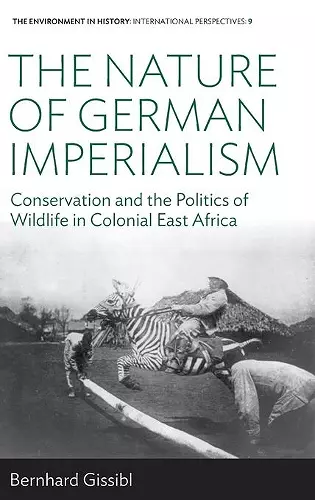The Nature of German Imperialism
Conservation and the Politics of Wildlife in Colonial East Africa
Format:Hardback
Publisher:Berghahn Books
Published:1st Jul '16
Should be back in stock very soon

Today, the East African state of Tanzania is renowned for wildlife preserves such as the Serengeti National Park, the Ngorongoro Conservation Area, and the Selous Game Reserve. Yet few know that most of these initiatives emerged from decades of German colonial rule. This book gives the first full account of Tanzanian wildlife conservation up until World War I, focusing upon elephant hunting and the ivory trade as vital factors in a shift from exploitation to preservation that increasingly excluded indigenous Africans. Analyzing the formative interactions between colonial governance and the natural world, The Nature of German Imperialism situates East African wildlife policies within the global emergence of conservationist sensibilities around 1900.
“The Nature of German Imperialism is at once an analytic tour de force and an empirically rich and cogent account of wildlife conservation as an ideologically charged political activity rife with contradictions and denials…His grounding of German imperialism in the wider turn-of- the-century European intellectual and social history is a most welcome contribution to East African studies.”• Finalist for the 2017 BETHWELL A. OGOT BOOK PRIZE of the African Studies Association
“Reading Gissibl’s study, one is impressed by the large variety of archival sources gathered in numerous archives across five different countries, and by the vast amount of printed (periodical) publications that have been consulted. Besides the fact that The Nature of German Colonialism is methodologically sound, extremely inspiring and well written, it succeeds in linking past events and controversies of political ecology to the present.”• German History
“The Nature of German Imperialism is a richly informative history of German concern for wildlife in nineteenth- and twentieth-century East Africa.&rqduo;• Environment and Society
“…an outstanding contribution to imperial history… Based on more than twenty archives and libraries in Germany, Africa, the UK, and the U.S., Gissibl’s book will remain the last word on the subject of wildlife management in German East Africa for a long time to come.”• American Historical Review
“Gissibl’s well-researched, well-written, and well-documented book is a treasure trove of information on the globalization of environmental conservation. Though centered on wild- life preservation in Tanzania under German rule, the book’s coverage is wider. It not only treats nature–human relationships in the precolonial and colonial periods but also global environmentalism in the postcolonial period. Consequently, the book has a broad appeal.”• Journal of African History
“Apart from its interesting and fascinating topic, the study represents an excellent methodological example of ‘entangle history’.”• Historische Zeitschrift
“The book impresses with all its components: the convincing arguments, the elegant language, the abundance of sources that the author has discovered and, last but not least, with the connection to current debates within the environmental-historical discipline. Bernard Gissibl has with this book written a long overdue and, as becomes clear, central chapter of German colonial rule in East Africa - and at the same time an excellent book on environmental history.”• Werkstatt Geschichte
“The Nature of German Imperialism is an impeccably researched work of interdisciplinary imperialhistory that shifts the geographic and temporal frames of Germany’s overseas empire, while making a compelling case that its relatively short-lived imperial enterprise continues to shape East African land-use patterns and cultures of conservation today.”• German Studies Review
“This exhaustively researched monograph is the first comprehensive study of wildlife conservation (especially elephants), big game-hunting, and early proposals for national parks and nature tourism in German East Africa…Scholars interested in the colonial origins of wildlife conservation in Tanzania will find The Nature of German Imperialism the best resource to date.”• Modern Language Review
“This is an impressive piece of scholarship. Painstaking in its detail, the book results from the intellectual labor needed to consult archives in four countries across two continents, comb through published sources in English and German, organize the analysis using political ecology, and situate this history in three distinct historiographies.”• The International Journal of African Historical Studies
“The very readable study invites giving some thought to the ecological and social consequences of the still popular construction of East Africa as a paradise for wild animals. Its historiographical significance is due to Gissibl’s distancing himself from constructivist approaches and his conceptual preference for a ‘critical realism’… Gissibl’s study is from now on the central reference work for the history of wildlife protection during the German colonial period. For colonial rule is here consistently and logically interpreted from environmental-historical perspectives.”• Sehepunkte
“Upon completion of this book the reader easily captures the importance and complexities of conservation and wildlife policies in German East Africa. This has much to do with Gissibl’s adept ability to tell layered and contextualized stories that ground themselves in the existing scholarship… Along the way the author also continually challenges widespread colonial myths by bringing in local African voices… Gissibl employs an impressively wide array of methodological tools as he helps bring the German colonial empire into a rather Anglophile environmental historiography.”• Environmental History
“Compellingly written and tightly argued, The Nature of German Imperialism will be of great interest to historians of Germany, imperialism and the environment. Present-day conservationists, too, will read it to their benefit.”• Environment and History
“This is a truly outstanding study of a topic that has been only tangentially treated in the literature. Gissibl draws upon an impressive body of evidence, weaving sources together seamlessly without letting the details occlude the main arguments and conceptual direction.”• Jane Carruthers, University of South Africa
- Short-listed for Bethwell A. Ogot Book Prize of the African Studies Association 2017
ISBN: 9781785331756
Dimensions: unknown
Weight: 671g
374 pages